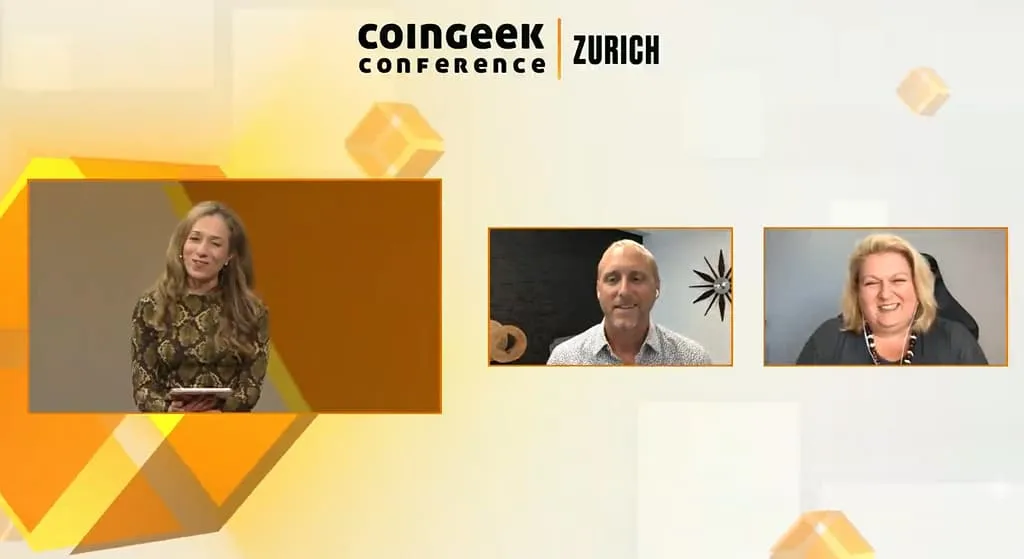|
Getting your Trinity Audio player ready...
|
BSV blockchain technology is redefining who can serve as a marketing partner, while making it easier for companies to connect with influencers in a way that promises to dramatically overhaul this space.
Last week’s CoinGeek Conference in Zurich featured a panel devoted to performance advertising and affiliate marketing, hosted by CoinGeek’s Lead Gaming Industry Reporter Becky Liggero Fontana. Joining her were Luke Rohenaz, co-founder and CEO of TonicPow; Frank Vertolli, co-founder and managing partner of Net Conversion; and Lee-Ann Johnstone, CEO and founder of AffiliateINSIDER.

For the uninitiated, Rohenaz described TonicPow as a promotion marketplace where brands and influencers can shop for one another. TonicPow builds tools that allow both sides of these deals to avoid a one-size-fits-all template in favor of custom, mutually-beneficial agreements.
For the past 14 years, Vertolli’s Net Conversion has specialized in paid media and comprehensive analytics, with a primary focus on travel and tourism as well as some other key verticals.
Johnstone’s firm is an agency, training company and media content hub that help brands build successful affiliate marketing programs in a number of verticals, predominantly iGaming, while also operating in the retail space.
The state of the nation
Vertolli said the digital marketing duopoly of Google and Facebook continues to expand, which has its benefits in terms of scale but also invokes concerns regarding privacy, oversight and corporate self-interest. Advertising has become an incredibly noisy environment based on who can scream the loudest and make the biggest splash by buying the most impressions.

Johnstone said the digital marketing ecosystem had been building on old systems and processes for so long that the current set-up involves multiple layers of solutions (tracking, reporting, ad-serving, etc.) across multiple platforms that ultimately cloud transparency, preventing you from having a clear linear link between brand and customer.
As a former affiliate herself, Liggero Fontana said one of her main beefs was her end-of-the-month calculations to figure out how much money a partner company was making. Having all that data on a single platform would have not only simplified these calculations, it would also have allowed her to devote more time to performing other client-specific tasks.
Vertolli said all companies, regardless of size, are drowning in data produced by different facets of their operations. There’s value in that data but the challenge is organizing it in a way that’s structured, open and readable to allow you to make practical business decisions and reach consumers in a more efficient and effective way.
Rohenaz said blockchain was a natural fit for data interoperability in that it’s a neutral database accessible by many entities. Structuring data in the same way from one company to another allows easier reading and processing of that data.
All aboard
Johnstone observed that nowadays, with supercomputers in all our pockets, pretty much anyone can become an affiliate, and any influencer with a social media channel can create and monetize content. Johnstone said this segment grew 10% during COVID, twice the rate of growth in paid ad channels. Scaling this sector with increased transparency is paramount.
Rohenaz noted that TonicPow records every payout and action, with payouts happening on the blockchain itself. TonicPow uses metadata with every transaction that describes the type of transaction and what campaign it was related to, but it doesn’t record anything that’s private or which could be personally identifying.
The blockchain offers a public record that cannot be altered, to which everyone can refer back and piece together the whole story. Moreover, the information is there for anyone to read, allowing third parties to make independent analysis tools to understand the lay of the land without even having to sign up.
Who do you trust?
Blockchain tech could also help avoid the friction that tends to erupt when an affiliate’s tracking system tells one story of the traffic they’re driving to a client while the client’s own tracking solution data tells a different story.

Vertolli repeated a phrase he heard earlier in the Conference, namely, the quest for a “single source of truth.” Reflecting on his past experience in the travel business, he recalled how any number of entities claimed the same traveler as their “client” as he/she/they transited through airlines, hotels, theme parks.
Vertolli added that certain transactions (real estate, new cars, holidays, etc.) can be the result of days/weeks/months of research, making it hard to determine what the crucial factor was in closing the deal. In many cases, whatever happened immediately before the most-desired action gets the credit.
Larger data sets offer more visibility into what happens along a consumer’s journey and how to compensate accordingly for attention, engagement and actual conversion. BSV can better spread the value across the whole influence chain but the current process remains heavily skewed toward this “last click” paradigm.
Johnstone added that affiliate managers/digital marketers are responsible for ensuring their marketing budgets are optimally spent to ensure the best return on investment. Getting more transparency across all one’s customers in terms of their ‘hot touch’ points would reduce channeling marketing spend into dead ends.
Pay to spray & pray
Johnstone expressed hope that products such as TonicPow might enable companies to reach ‘micro-pocket’ audiences that traditional ‘spray and pray’ advertising can’t. TonicPow’s use of BSV, with its capacity for cost-effective micropayments, offers the means to deliver targeted, truly niche communications to the people you want to reach.

Restating his company’s aversion to one-size-fits-all, Rohenaz said TonicPow was in the process of allowing companies to negotiate custom rates for the promoters they choose to partner with. Similarly, TonicPow provides greater clarity for advertisers to evaluate whether an existing deal is providing the valuable traffic they originally sought.
There are certain protections in place, but Rohenaz noted that TonicPow advertisers/promoters who’ve attained a certain level receive instant payouts. The minute they get a click they’ll receive a notification on their phone or wallet (if neophyte customers lack wallets, TonicPow will even create one for you to hold your earnings).
Johnstone said delayed payouts remain a major problem for affiliates and influencers who really get their audiences, along with the products they’re promoting and the accompanying messaging. Without instant payouts, affiliates who are on to something good may lack the capacity to reinvest their resources and scale their efforts to take proper advantage of this momentum.
Johnstone said TonicPow provides scale, sitting somewhere between the old ‘refer a friend’ scheme and the more complex affiliate economy. Rohenaz said the goal was to continually add new advertisers and influencers alike, adding that this was a good time for both sides of this coin to dip their toes into TonicPow’s waters.
Vertolli concluded by noting that this whole sector was all about reaching the right person with the right message at the right time. The introduction of BSV blockchain tech means companies don’t have to reach as many people as before because they can now target more qualified people who are more receptive to your message. The traditional channels in this space will continue to exist, but the blockchain-based affiliate/influencer channel will soon be punching well above its weight class.

 07-12-2025
07-12-2025 





